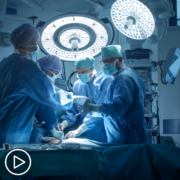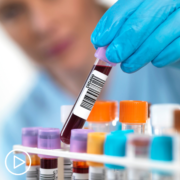How Can Breast Cancer Genetic Testing Empower Women?
How Can Breast Cancer Genetic Testing Empower Women? from Patient Empowerment Network on Vimeo.
Dr. Stephanie Valente explains how breast cancer genetic testing results can help women learn about their breast cancer risk and guide prognosis and treatment choices.
Dr. Stephanie Valente is the Director of the Breast Surgery Fellowship Program at Cleveland Clinic. More about this expert here.
See More From INSIST! Metastatic Breast Cancer
Related Resources:
Transcript:
Dr. Valente:
So, genetic testing in this day and age is really empowering to a lot of women. So, it allows women to take control of their health from the beginning. So, if somebody has a strong family history of breast cancer, and that woman doesn’t have breast cancer but wants to know if she’s at an increased genetic risk for developing breast cancer in her lifetime – Knowing that risk and if a gene is identified, that woman could undergo high-risk screening.
So, saying if she develops breast cancer, it would be caught early, and she can go into a high-risk program. Or she can elect to prophylactically – meaning before cancer – remove her breasts. That would be both of the breasts with a mastectomy – Again, with or without reconstruction. And so, that decreases the risk.
Nothing in life is 100%. But it essentially decreases the risk of getting breast cancer. Some of the genes, like the BRCA gene – that’s a very common gene – is a 60% to 80% lifetime risk of developing breast cancer. And so, that would take that lifetime risk down to about 5% risk of developing breast cancer. And so, that’s empowering for a lot of women. And so, some women do elect to have that procedure.
The other thing for genetic testing is that for women who are diagnosed with breast cancer, sometimes the triple-negative breast cancer – finding out whether or not they carry a BRCA gene. We know that certain genes in triple-negative breast cancer allow patients to have better treatment outcomes with certain chemotherapy. So, the medical oncologist may opt to add a specific chemotherapy based on whether or not that patient actually carries a genetic mutation.









